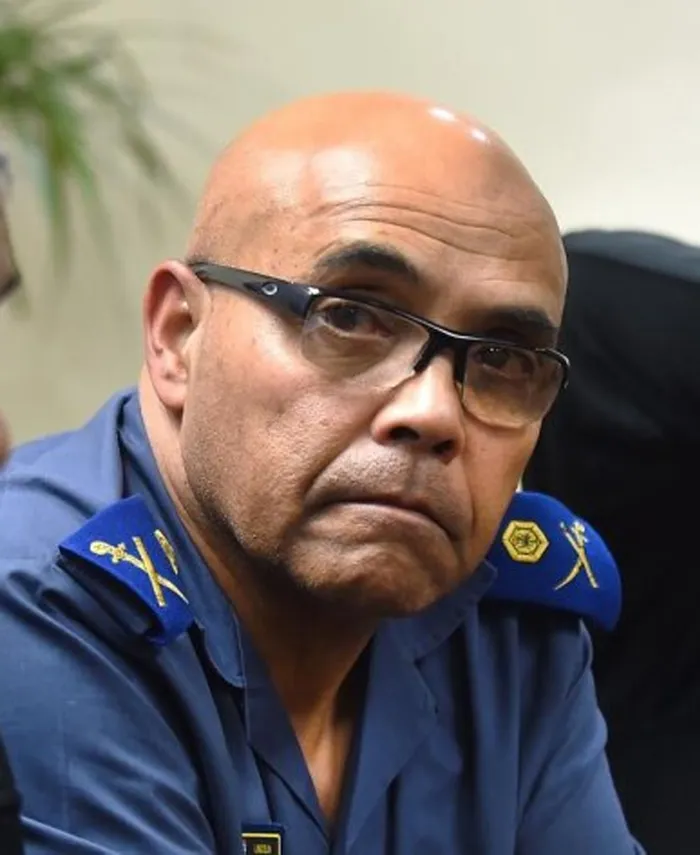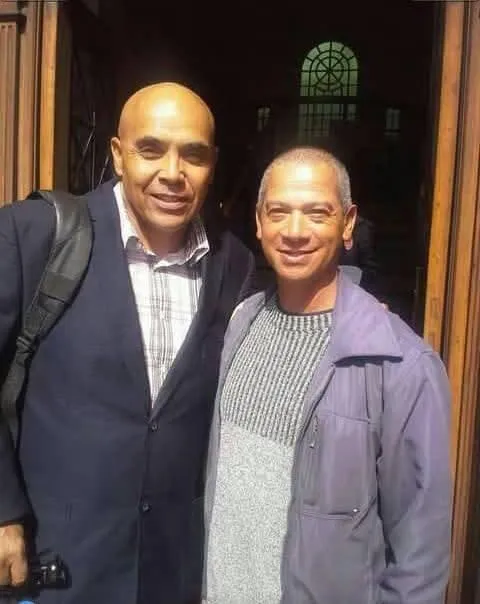Community leaders pay tribute to Major-General André Lincoln's legacy in crime fighting

Late Major-General André Lincoln, who died on May 30, will be laid to rest on Saturday, June 14.
Image: Phando Jikelo / Independent Newspapers
Community safety activists in Mitchell's Plain have described late retired Major-General André Lincoln as someone who was revered and admired by residents and his colleagues in the police.
Major-General Lincoln died on Friday, May 30.
The funeral service, which was held at St James Church in Kenilworth on Saturday, June 14, was conducted by Anglican priest Father Michael Weeder. Reverand Dr Alan Boesak delivered a special tribute.
Ben de Vos, an independent criminologist and community activist who serves on the Mitchell's Plain community police forum (CPF) said, Major-General Lincoln's death comes at a time when violence on the Cape Flats has reached boiling point, even attracting international attention during presidents Cyril Ramaphosa and Donald Trump's recent White House meeting.
Mr De Vos said that the failure by the South African government, particularly the police, to deal effectively with gangsterism resurfaced as a significant issue for residents in Mitchells Plain and across the Cape Flats.
"It is in the light of this that ordinary citizens, who feel the brunt of gangsterism as a daily reality, feel the loss of someone who once gave them hope most intensely. André Lincoln has become a household name in the fight against gangsterism on the Cape Flats during his time of active duty and commanded respect from both criminals and ordinary citizens," he said.
Mr De Vos described Major-General Lincoln as an intrepid police officer who was well-connected and close to the community that he policed.
"While in the Presidential Task Team during the term of late president Nelson Mandela, his detractors in the police attacked his courageous efforts and work, especially those who kicked against the pricks of transformation and accountability.
"It is always common and inevitable for a person of his calibre to have experienced opposition from within the ranks of the SAPS," he said.
Mr De Vos said that "this fierce opposition" resurfaced during the formation of the anti-gang unit in 2018.
"Ironically, it became apparent that his opposition to succeed against the gangs was from within the ranks of SAPS.
"His unwavering dedication and commitment to dismantle the gangs inspired many academics, lawmakers, activists, and ordinary citizens in the forefront of fighting the scourge. He will sorely be missed," Mr De Vos said.
Mr Vos said Major-General Lincoln's example and legacy served as a renewed catalyst and source of inspiration, giving impetus to the Mitchells Plain CPF and the civil society platform Cape Crime Crisis Coalition (C4) to call for a national commission of inquiry into gangsterism.

Pictured here from left, are late Major-General André Lincoln and Lentegeur community police forum chairperson Michael Jacobs outside the Cape High Court in 2017.
Image: Supplied
Michael Jacobs, chairperson of the Lentegeur CPF, said he will miss Major-General Lincoln, whom he met in the 1990s.
"I met Major-General Lincoln just after the unbanning of the ANC and other liberation movements. He was committed to serve the people of South Africa as a police officer.
"He always carried himself with dignity and self composure, even through adversity and attacks on his character. He was the champion of the Men For Change initiative in SAPS Western Cape and inspired others to lead with compassion and example. "He will surely be missed by his loved ones," Mr Jacobs said.
Strandfontein CPF chairperson Sandy Schuter Flowers hailed Major-General Lincoln as a champion of justice and human rights.
His unwavering commitment to serving and protecting our communities will be deeply missed, she said.
"As a dedicated public servant, Major-General Lincoln was more than just a policeman, he was a mentor, a friend, and a passionate advocate for the rights and dignity of all people. I had the privilege of working with him, and his support and guidance were invaluable."
Ms Schuter Flowers, who is also an avid pigeon-racing enthusiast, said Major-General Lincoln understood the struggles of communities and knew how to connect with people on a personal level.
"He was a strong supporter of our community's struggles, and consistently demonstrated his commitment to justice and human rights.
"He would always show interest in whichever protest marches I was either leading or attending. While he kept a close eye on my activities in the world of crime fighting, he also showed a special interest in our pigeon racing. "He would always check in with a 'Hey mama duif, wat sê die duiwe vandag', and would especially inquire daily during pigeon racing season," adding that she would often post videos of her speeches, and he would always call or text to laugh about the conversations she had with the birds.
"I often give my birds motivational speeches, and when I'd post videos of my speeches, he would always call or text to laugh about the stuff I said to the birds. "This year, I have not received that text or call," she said.
Trevor Davids, the Lincoln family's spokesperson for the funeral, said that while the major-general retired due to health reasons, he never stopped being a crime fighter.
"Andre ended up advising people and community organisations, as his institutional knowledge of policing was very vast.
"He enjoyed his retirement and spent more time with his family, especially his children, which was valuable. He wasn’t forced out of the police to retire – it was due to his status as an amputee.
"Prior to him losing his legs, there were multiple hits out on him. He was still going to testify in the Charl Kinnear assassination case. Even then, he made it clear that he will not let his life be dictated to by criminals," he said.
Community activist Lucinda Evans said Major-General Lincoln was a soldier and friend who protected the police, country, and communities.
"Through our gender-based violence journeys, to caring for your members when the call came and you asked, can you help, to the many campaigns you supported in your police and biker uniforms, many arguments and having a coffee, you would say, 'Sista Revolutionary, is ons oraait,' she said.
Ms Evans recalled the first time she met Major-General Lincoln at a protest in Lavender Hill. "Lavender Hill was red, and so was I. We were going to close the road, and did. He called me the soldier for her people. That day, I was ready to be arrested," she said.
Mr Davids said, despite his physical challenges as an amputee, Major-General Lincoln was passionate about life.
"He still went to the gym, his car and motorbike were modified to be driven by an amputee. He had a will to live and loved life," he said.
Mr Davids stated that his late friend's life was upheld by several pillars, particularly his service to the country as a policeman, his unconditional service to the community, and his activism against the abuse of women and children.
"Being a human rights activist in the post-1994 era as a policeman, he stood up against the abuse of women and children.
"When he was reinstated into the police service, he instilled that in the police station where he served. He made the fight against women and children a priority, especially concerning policemen themselves that abused their women and children.
He was still a champion for women and children in his retirement, doing so quietly without people knowing," he said.
Mr Davids said the major-general's life as a biker, which dates back to the 80s, and involvement in martial arts, were also key aspects of his life.
"His family was the thread that ran through it all," he added.